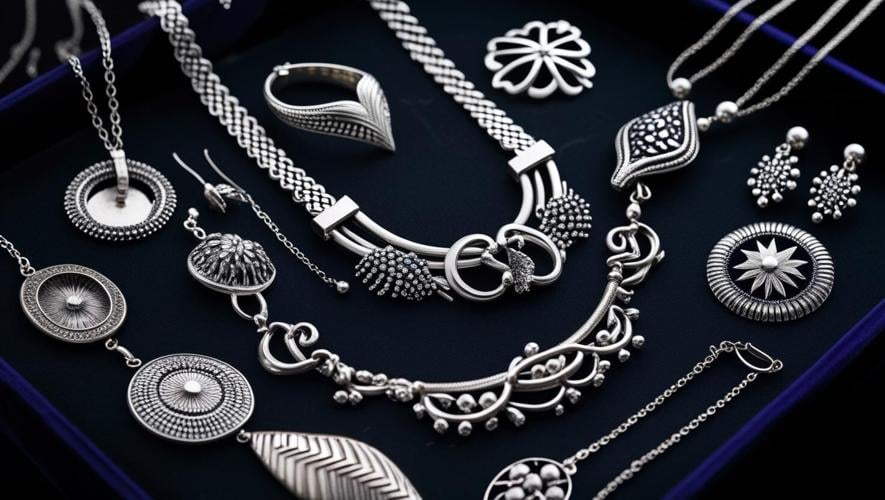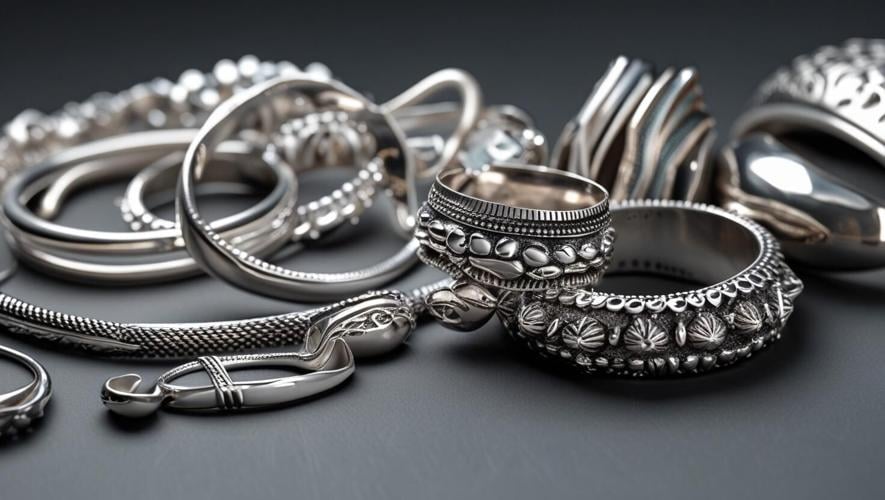
Silver Jewelry is beautiful, versatile, and valuable, but only if it’s genuine. With counterfeits flooding online markets and even local shops, knowing how to verify the authenticity of 925 silver jewelry has never been more important. Purchasing from a reputable online store can help ensure you are getting authentic silver jewelry. Whether you’re shopping for silver jewelry bracelets, necklaces, rings, earrings, and pendants, our collection offers a wide variety of styles to suit every taste. Silver jewelry has made a significant impact on the world of fashion, admired for its timeless appeal and global influence.
Explore our extensive collection of sterling silver jewelry, including statement pieces adorned with gemstones and gold accents.
This guide will walk you through the process of identifying real 925 silver so you can shop with confidence. Rest assured, all your silver jewelry needs are covered, whether you’re seeking classic designs or bold statement pieces.
Introduction to 925 Silver Jewelry

The world of jewelry is filled with various metals, but one that stands out for its quality and affordability is 925 silver jewelry, also known as sterling silver jewelry. This type of jewelry is made from 92.5% silver, which is why it’s often stamped with “925” to indicate its authenticity. Sterling silver jewelry is a popular choice for those who want to make a statement with their accessories without breaking the bank. From elegant necklaces and sophisticated earrings to bold rings and charming bracelets, sterling silver jewelry offers a wide range of options to suit every style and preference. Whether you’re looking to explore the world of fine jewelry or simply want to add a touch of elegance to your everyday look, sterling silver jewelry is an excellent choice. With its durability and versatility, it’s no wonder that sterling silver jewelry has become a staple in many people’s collections, often paired with gold and gemstones to create truly unique pieces.
What Does “925” Really Mean?
925 is a stamp used to indicate the purity of silver used in jewelry and is the standard for sterling silver jewelry. It means that the piece contains 92.5% pure silver, with the remaining 7.5% usually made up of copper or another alloy. This combination gives Silver Jewelry the perfect balance of softness, durability, and shine.
Why Is Pure Silver Not Used?
Pure silver (99.9%) is too soft for crafting everyday wear items. It would bend or scratch too easily. Adding a small amount of another metal, usually copper, enhances its strength and durability without compromising its shine. Hence, the creation of sterling silver or 925 silver jewelry.
Common Signs of Genuine 925 Sterling Silver Jewelry
Real 925 Silver Jewelry has several telltale qualities. Here’s what to look for when determining whether your piece is authentic:
Hallmarks such as "925" or "Sterling"
Non-magnetic properties
Tarnishing that can be polished away
High shine and luster
Moderate weight
Genuine silver jewelry also develops a natural patina over time, which is a sign of authenticity.
Look for Hallmarks or Stamps
The first and most obvious sign is the presence of a hallmark. Authentic 925 Silver Jewelry will typically be stamped with markings like:
925
Sterling
Ster
S925
You’ll usually find this marking on the clasp, inner band, or underside of the jewelry. If there’s no visible stamp, that’s a red flag.
Beware of Misleading Marks
Some fake pieces use hallmarks to deceive buyers. However, counterfeiters might use inaccurate fonts, incorrect placement, or fake oxidation to create an illusion of authenticity. Always inspect hallmarks carefully and use a magnifier if needed.
Perform a Physical Inspection
You don’t need to be a jeweler to spot some of the more obvious differences between real and fake Silver Jewelry. Here’s what you can do at home:
Feel the weight – Sterling silver has a solid, substantial weight.
Check the color – Real silver has a soft white-grey tone. Real silver may also show slight oxidation, which can be polished away.
Smell the metal – Authentic silver is odorless.
Rub test – Rub with a soft white cloth; black marks mean it’s real.
Statement pieces or those featuring gemstones or gold accents should be inspected with extra care, as these designs are often targeted by counterfeiters.
Use a Magnet
Silver is not magnetic. If your piece sticks to a magnet, it’s probably fake. While not foolproof, it’s a quick and simple check.
Conduct At-Home Authenticity Tests
Still unsure? Try these DIY tests, such as the acid test, to verify your Silver Jewelry.
The Ice Cube Test
Place an ice cube on the jewelry. Silver conducts heat rapidly, so the cube should melt faster than on a wooden or plastic surface.
The Nitric Acid Test
Apply a drop of nitric acid on an inconspicuous area. If it turns green, it’s fake. If it turns creamy white, it’s genuine. Handle with extreme care.
Certifications and Documentation
When shopping for sterling silver jewelry, it’s essential to look for certifications and documentation that prove the item’s authenticity. A genuine sterling silver piece will typically be stamped with “925” or “sterling silver” to indicate that it meets the standard of containing at least 92.5% silver. This certification is crucial because it ensures that the jewelry is made from high-quality materials and is less likely to cause skin irritation or other adverse reactions. Additionally, reputable sellers will often provide documentation, such as a certificate of authenticity, to verify the item’s quality and composition. By checking for these certifications and documents, you can ensure that you’re getting a genuine sterling silver piece that will last for years to come. Whether you’re shopping online or in-store, always click on the product details to explore the options and results, and don’t hesitate to continue to the cart if you’re satisfied with your selection. With the right certifications and documentation, you can trust that your sterling silver jewelry is a valuable addition to your collection, and you can wear it with confidence, mixing it with other metals like gold and charms, or pairing it with beautiful gemstones.
Get a Professional Appraisal
For expensive or sentimental pieces, see a professional jeweler. They can use:
Electronic testers
XRF (X-ray fluorescence)
Ultrasonic machines
Assay
These tests give definitive answers and are often needed for insurance or resale. Certified professionals can issue documentation verifying authenticity.
Buy from Reputable Sellers
Most importantly, always buy Silver Jewelry from trusted sellers:
Provide certificates of authenticity
Offer verified reviews
Are transparent about materials
Clearly display both the regular price and the highest price of their silver jewelry collection
Offer a warranty on their silver jewelry
Shops like Teddy Howler Jewelry specialize in authentic silver jewelry that’s clearly marked and backed by customer support.
Why Authenticity Matters for Silver Jewelry
Wearing real Silver Jewelry isn’t just about style, it’s about value and safety. Fake silver can:
Tarnish quickly
Causes skin irritation
Lose value or peel
Authentic 925 Silver Jewelry, on the other hand, lasts decades, looks better with age, and maintains resale value. Genuine silver jewelry can also be considered a long-term investment.
Tips to Maintain Your 925 Silver Jewelry
Once verified, take care of your Silver Jewelry to preserve its beauty.
Everyday Cleaning Tips
Wipe with a microfiber or polishing cloth
Soak in mild soap and water
Dry thoroughly before storing
Proper Storage
Store in anti-tarnish bags or boxes. Avoid storing with other metals to prevent scratches. Keep away from humidity.
Advanced Testing Methods for Silver Jewelry
Collectors and investors may need high-end verification methods, and sometimes laboratory testing is required.
X-Ray Fluorescence (XRF) Analysis
Used in auctions and labs, XRF tests show exact metal composition without damaging the piece.
Ultrasonic Testing
Measures density and checks for hidden defects or non-silver fillings.
The Problem with Plated Silver Jewelry
Plated jewelry has a thin silver coat over cheap metals. These cheap metals are often referred to as base metals.
Warning Signs:
Very low price
Color fades or turns green
Can cause allergic reactions
Don’t mistake these for real Silver Jewelry; they don’t last or hold value.
How to Shop Smart for 925 Silver Rings Online
When buying online, look beyond the photo. Before making a purchase, review the seller's return policy to ensure you understand your options if the ring doesn't meet your expectations. Take a moment to explore the seller’s full collection of silver jewelry to see the variety of designs and styles available.
Check the Listing Details
Reputable shops will list:
“925 Sterling Silver” in the title
Weight and dimensions
Stamp location and material origin
Avoid vague terms like “silver-colored.”
Research the Seller
Check for verified buyer reviews
Look for real websites and contact info
Be wary of huge price drops
Genuine silver jewelry has hallmarks and passes at-home or professional tests.
Avoid knock-offs by buying from reputable stores.
Store and clean your pieces properly to extend their lifespan.
FAQ
Q1: What is the difference between 925 silver and pure silver?
A1: 925 silver contains 92.5% silver and 7.5% copper. Pure silver (99.9%) is too soft for jewelry.
Q2: Can fake silver still have a 925 stamp?
A2: Yes. Always check feel, smell, magnetism, and verify with other tests.
Q3: Is tarnishing a sign of fake silver?
A3: No. Real silver tarnishes naturally, while fake silver peels or rusts.



(0) comments
We welcome your comments
Log In
Post a comment as Guest
Keep it Clean. Please avoid obscene, vulgar, lewd, racist or sexually-oriented language.
PLEASE TURN OFF YOUR CAPS LOCK.
Don't Threaten. Threats of harming another person will not be tolerated.
Be Truthful. Don't knowingly lie about anyone or anything.
Be Nice. No racism, sexism or any sort of -ism that is degrading to another person.
Be Proactive. Use the 'Report' link on each comment to let us know of abusive posts.
Share with Us. We'd love to hear eyewitness accounts, the history behind an article.